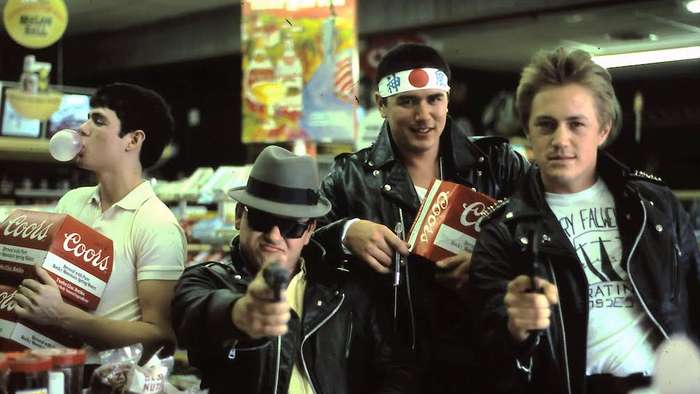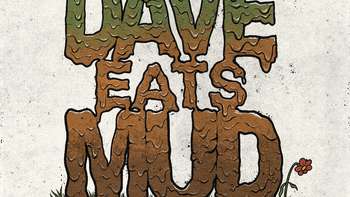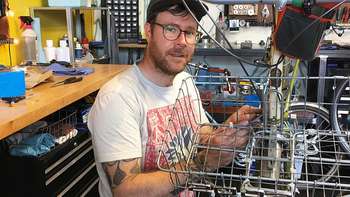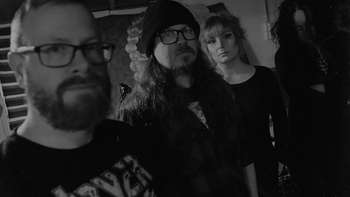Scene Point Blank: You stated in the book that band members were avid readers while on tour and also The Catcher In The Rye was read many times on that tour. Were you an avid reader?
Mike Magrann: Yeah, I was. I was in college during that tour and I was an English major and a creative writing major with a minor in literature. So on these travels, I have a pile of books to get through and I've always been more of a fiction guy anyway. That's why a straight biography didn't appeal to me. I think I did get the rest of the guys infected on reading because how many zines or punk rock magazines can you read on 10-hour drives for a week? Yes, I told the guys to check this book out, Catcher In The Rye by Salinger, and it stuck with us -- or resonated with most.
Scene Point Blank: It's funny because I spoke to Ivan Julian (Richard Hell's guitarist), and he kind of said the same thing: we're musicians, we wait around a lot with soundcheck and stuff, so we read a lot. What else are you going to do?
Mike Magrann: What sucks is now everyone would be on their phone. But I agree with Ivan: most bands travel with books or mixtapes in their vans. I am thankful that people still read or write and put down their phones and sit quietly for a couple of hours. God bless people who read your stuff. Reading was, at one time something, more people would look forward to doing. Now I think it is a bit like pulling teeth.
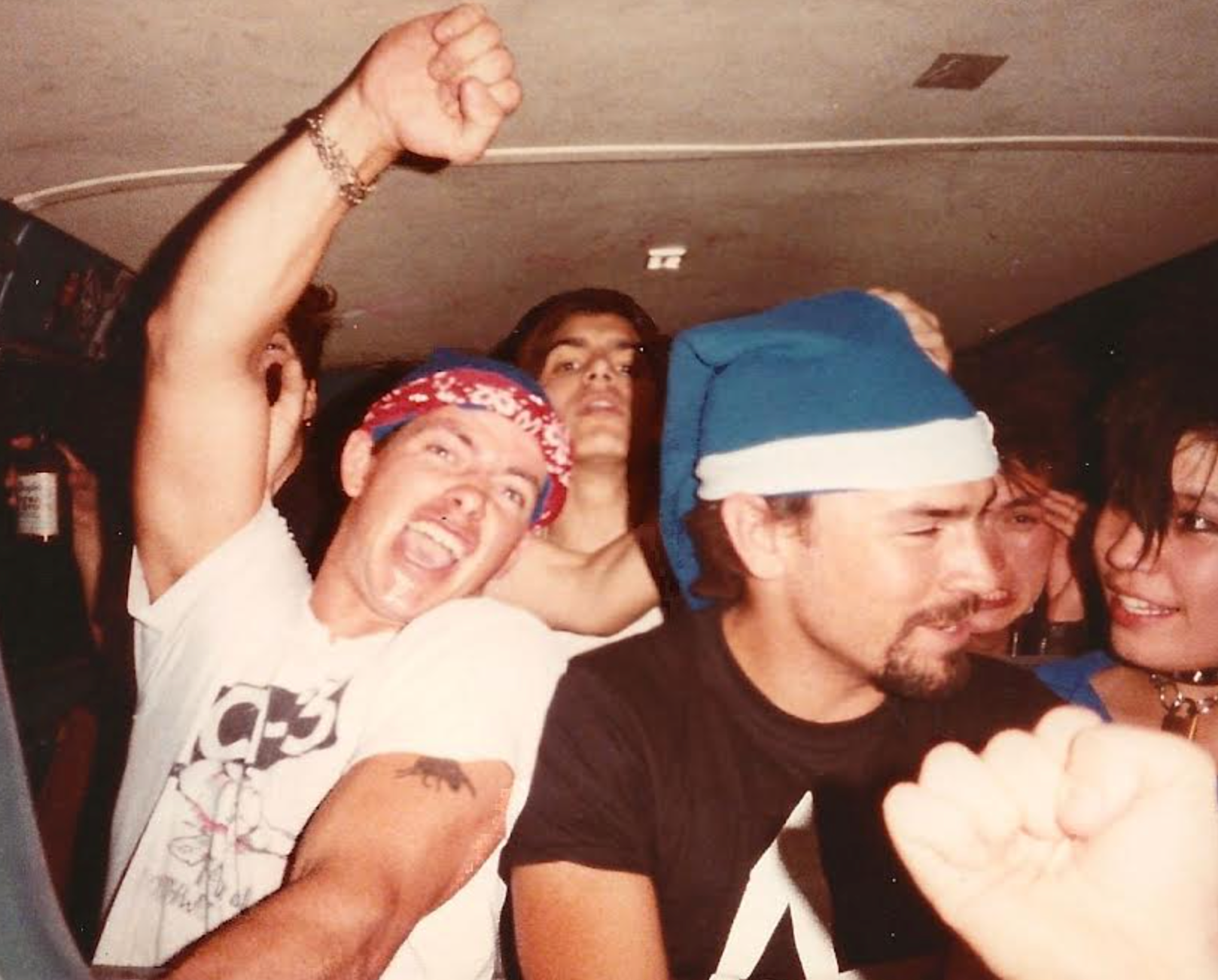
Scene Point Blank: What happened to Robbie Fields (Posh Boy)? Is he still around? Is he still involved with music?
Mike Magrann: Yeah, it's funny. He just sent me a picture. He's in Tokyo again and he went to the big punk festival out there.
When we were in Japan in October we crossed paths with Robbie. Kimm and I went out to lunch with him. He wasn't up to going to the show that night. He remains a world traveler and is constantly moving around the world on these incredible deals. He falls into these free cruises for weeks and they take him from New York to Japan or something like that. He lives in Estonia and he is either in Thailand or South Africa or somewhere crazy. He is, indeed, very much alive and still representing all the music -- which is wild. He takes care of our back catalogue.
Scene Point Blank: He was pretty instrumental in getting you guys going, right?
Mike Magrann: Yeah, I mean, we truly had not even played a club yet, but by the time he put us in the studio to record that record, we were just a party band! We put out a little demo tape just for our kicks and he got a hold of it and said, “No, we're gonna make a record.” We just had no idea that could happen to us and we were always appreciative of it. He's one of those figures that, throughout the years, had a lot of people that were detractors saying he was just using the punk rock bands to make his money. There wasn't a whole lot of money to be had, so I don't understand that, but he took a shot on us and got us out there, so we're forever grateful.
Scene Point Blank: Does Posh Boy still exist as a label? I think I saw something that was released a couple of years back, digitally.
Mike Magrann: Correct. He is releasing stuff digitally. He doesn't get involved in all the vinyl repressing. He thinks that is too messy. However, it seems that is what people want these days. Anyways, so Robbie works on licensing because nowadays that is the name of the game: to get a snippet of your song in a video game, movie, or TV show. That is where the real money is. We had those opportunities pop up on video games or little TV shows.
Scene Point Blank: But that wasn't just a little TV show -- that was Stranger Things, wasn't it?
Mike Magrann:Yeah, that's the one!
Scene Point Blank: I have heard before that is the cash cow -- or to make money off merchandising/touring. Bands don't make money off their music anymore.
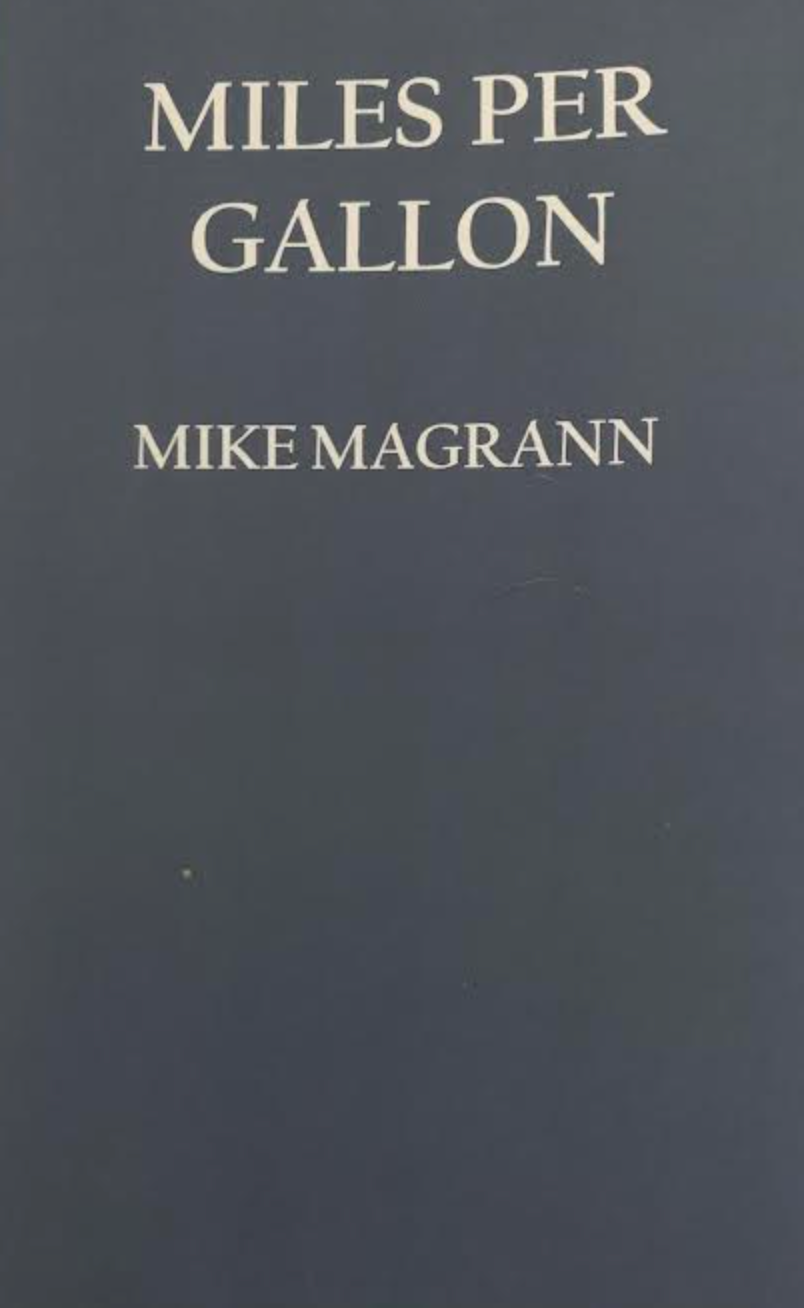
Mike Magrann: It's funny because I hear people say shit like, “What a sellout.” I just heard Iggy Pop on a cruise line commercial. My take is that someone in an advertising agency remembers this perfect song from when they were a kid. That also shows that punk rockers are getting into power. So for all those people who think bands sell out, I would say I am all about it, man. Bands have to survive. The industry has changed and people have to eat.
Scene Point Blank: Do you guys own the rights to most of your music?
Mike Magrann: We don't own the rights to the early stuff but for everything past that we have our own publishing company. However, the songs that everyone knows are those early first ones. Robbie takes care of those and he does still pay us. We have had conversations with him. If he ever decides to hang it up or he passes away we don't want to fight his children for our music. I need to have it back someday. We have a gentlemen's agreement that it will happen. In the meantime, he is taking care of the music better than we could and that is fine with us.
Scene Point Blank: I was talking to another musician who stated if you own your rights to your music and you get enough hits you can do okay on Spotify. However, they had to buy back their rights to their music. It is all the young kids that got screwed with bad deals and now someone is making money off their music.
Mike Magrann: That is just the story of the music business going back to when they signed the first blues guy. That is why it is funny when all those major labels went bust because they were making fistfuls of money off the musicians and it was just obscene. They were huge, evil monoliths and doing what you said: screwing kids with bad contracts!
Scene Point Blank: It has been going on since the beginning of time, essentially, but it is a very common story where bands will state they didn't know what they were doing or signing and they got fucked by the devil.
Mike Magrann: In the late ‘80s and early ‘90s it was everyone's mission to get a major label contract and the people I know that did said it was pure hell. You would have a greater chance of making or pressing records out of your bedroom closet than any success with a major label. They gobbled many up and spat them out. I was glad when they went under.
Scene Point Blank: How did you get on No Future Records. I found it kind of weird that Channel 3 was sandwiched between all these British bands on the No Future compilations.
Mike Magrann: Yeah, that that was weird. I and not sure we were even really told anything about that. We were in a club in San Francisco one night and I saw flyers about a new release from Channel 3 on No Future Records. There was different artwork on the album cover and such. When I got home I called Robbie and asked what was going on. He stated, “Oh, yeah, you guys are now on No Future.” The label is out of the UK and it is a pretty big label. I think we were the only US band with a fully pressed LP on No Future. A lot of people, for years, thought we were a British band. We never used any goofy pictures or anything, so no one knew what we looked like.
Scene Point Blank: Was there not a release called The Skinhead Years? I always found that strange as I never considered Channel 3 as a skin or oi! Band.
Mike Magrann: That was when CDs first came out and it was a way to repackage the same old songs. Robbie told us that “there were these new things called compact discs and I am going to put all your records on them,” which we were okay with. At the time we had really big hair, which we found hilarious. [Laughs.] We never really thought about the negative connotations of the skinhead term at the time with all that racist, Nazi bullshit. We also thought it would be quite funny to release a CD comp called The Sellout Years. [Laughs.]
All the guys in the book are still alive. In all honesty, I said, “Let's find the van and we'll recreate that summer and we'll make a Netflix series.” I got no response whatsoever, haha!
Scene Point Blank: Were you not supposed to do a tour with your label mates Blitz at some point, but it got cancelled? I interviewed Nidge from Blitz years back -- just before that tour when he was coming to the USA. Sadly, he was killed by a car, crossing the road, I believe.
Mike Magrann: Yes, that was sad. We had just played with them a day or so prior and it was the first time we ever played with them. We told them the story of how we were supposed to come over years ago and play with them, but it never happened. We had a big group hug and took some pictures and two days later he jumped a guardrail trying to cross a street in Texas and was killed by a car.
Scene Point Blank: You had Jay Lansford from the Stepmothers and Simpletones playing with you at one point. I always thought the Stepmothers were one of those bands that slipped away.
Mike Magrann: Yes, they were a short-lived band and I think they were ahead of their time. Jay was our producer when we first came around. The Stepmothers were long-haired guys that probably didn't appeal to the punk rock crowd, but they were a solid band that morphed into The Unforgiven, who were a spaghetti western band. There was an intense bidding war for them in LA. All the majors thought they were the future of rock ‘n’ roll. They went in and made this big, overblown record and then went on tour with ZZ Top. The album did nothing and they were just dropped.
In between The Stepmothers and Unforgiven, we had Jay for a bit in Channel 3. I have kept in contact with him, but he is in Germany now. He moved out there and was in a band called Gigantor but slowly started working the business side of music with SPV Records and Motorhead. He is ramping down now and heading towards retirement.
Scene Point Blank: You stated you went to university. What did you do for work after Channel 3?
Mike Magrann: Well, I was a parent first and foremost, but I also had a part-time job in a metal fabrication company. I started by sweeping the floors but before long I was running and programming the machines and also was a customer representative. When they went out of business I just kept all my customers and opened up my own metal fabrication company. So I was a punk rock English major running my own business for 27 years. It provided well for myself and my family. It was tough towards the end with COVID. It dovetailed so it was the perfect time for me to step back. I am, indeed, retired now.
Scene Point Blank: Seems a lot of these bands are still doing what they love doing. I was in contact with Rick Wilder (Mau Maus, Berlin Brats) years back and they were doing some gigs at the Viper Room.
Mike Magrann: Wow, that is amazing. I didn't realize he was still alive, to be honest. It is such a weird phenomenon in southern California: almost every band from back in the day is still fucking playing and doing tours around the world and playing large festivals. It is nuts! I have been backstage with some of these guys and the talk has been about the fact we would never have predicted we would be doing this at 63 years of age! We are like the old bluesmen when they had this resurgence in the ‘60s. You are allowed to get out there and be fatter and balder and still play your music, which I think is amazing! [Laughs.]
We will be playing at the Rebellion Festival in the UK, which is a huge festival as you probably know. It's incredible, as it's all under one roof under this huge complex. They must have 100 different authors talking so I get to be part of that, and then we play on the Sunday along with Sweet and The Alarm.
Scene Point Blank: Do you still have a love for Hall and Oates?
Mike Magrann: [Laughs.] We thought it was funny to be these big bad punk rockers and listen to Hall and Oates. When you are trapped in a van you listen to the same mixtapes over and over. We soon realized, when you put it into perspective, that these guys are great songwriters and can write a catchy song.
Scene Point Blank: I think it was The Replacements who had a shrine to ABBA, and Tesco Vee is a huge ABBA fan; hence the song, “ABBA, God and Me.” Darryl Hall had a record called “Sacred Songs” that was produced by Robert Fripp in 1980.
Mike Magrann: The interesting thing is, when you create punk rock you, are coming from a background of pop music -- so it all works its way into your fabric somehow.
Scene Point Blank: Yes, and the older you get your palate gets a little widened and you become less judgmental.
Mike Magrann: I agree. As they say, “It's only rock ‘n’ roll, but I like it!” Thanks for the interview/talk.
